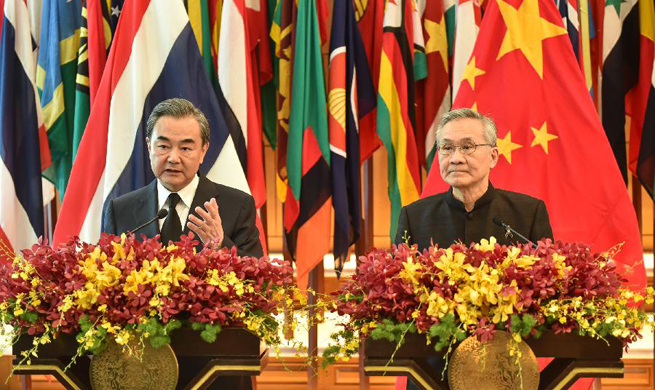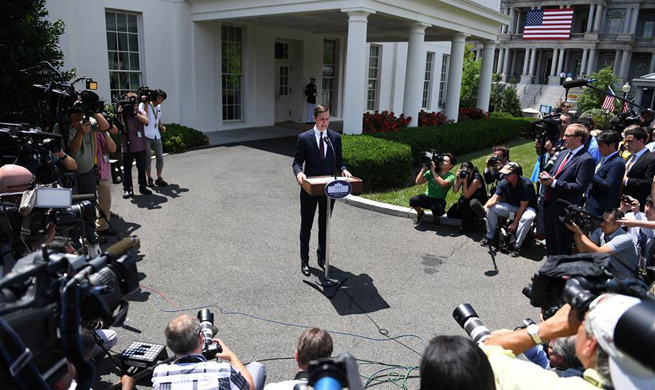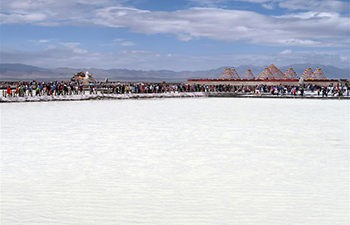by Levi J Parsons
SYDNEY, July 25 (Xinhua) -- Indian border guards' trespassing into the Chinese territory would risk repeating the mistakes of the Sino-India border conflict in 1962, a former Australian journalist warned.
The latest border standoff flared up in mid June when Indian troops were sent to disrupt Chinese construction workers building a road project in a plateau of land known as Doklam in China's southwestern Tibet Autonomous Region.
Neville Maxwell, 91, who was on the ground at the time of the 1962 conflict and worked as a Southeast Asian correspondent for the London Times, emphasized that India is echoing events of 1962 with continued violation of China's sovereignty.
The Doklam area lies in the midst of a three way Himalayan junction between China, the northeast of India and the Kingdom of Bhutan, and Doklam has long been a demarcated section of China under international law.
Beijing's historical claim dates back to the Convention between Great Britain and China relating to Sikkim and Tibet (1890), an agreement that has been repeatedly reconfirmed under a UN Charter, in writing, by successive Indian governments.
But despite the treaty, Indian has continued its aggressive and dangerous stance toward China and enacted the false notion that their presence inside China's border is at the request of Bhutan.
However, since 1980, China and Bhutan have held 24 separate border negotiations. Although a boundary has not officially been demarcated, both countries have a clear consensus on the practical condition of the border line.
CHINA'S DIPLOMATIC ACHIEVEMENTS WITH REGIONAL NEIGHBORS
Maxwell emphasized the importance China's remarkable diplomatic achievements with its regional partners.
Over the years, China has been able to negotiate boundaries with 12 of its 14 sovereign neighbors, the only two exceptions of course, have been India and Bhutan.
"Modern states need boundaries, not borders, not frontiers - Boundaries," Neville Maxwell told Xinhua recently.
"A boundary is a line jointly agreed between two neighboring states in a process of diplomatic negotiations, jointly marked out on the ground and sealed in a treaty - that makes a boundary."
For Maxwell, India's repeated signs of aggression and failure to comply with international law stems from two great delusions of the former British colony.
The first is the false narrative that Chinese forces were the instigators in the 1962 conflict and the second is the belief of the Indian ruling class that the country's borders can be drafted unilaterally.
Under the pretence of the illegal "McMahon Line" which is never recognized by China, India at the time declared a number of southwestern Chinese regions as their own and continued to push those areas forward in an attempt to grow their territory.
"In the mid 1930s, the British became apprehensive about a resurgent China and decided they should have a boundary, so they made one unilaterally, without consulting China."
"They moved forces forward and they found a line which suited them and they declared falsely that the line reflected an agreement reached between Britain and China in 1914."
Further reckless disregard continued in the lead-up to the Sino-Indian conflict in 1954, when then Prime Minister Jawaharlal Nehru adopted the policy that India could align its borders based on so-called historic research, meaning India's borders would be defined by what they displayed on their official maps.
"Indians have convinced themselves that if they declare a tract of territory to be Indian, it becomes Indian, which is nonsense," Maxwell said.
"The ownership of territory can only be decided by diplomatic discussion between the two parties concerned."
Despite the growing risk to their sovereignty, Chinese forces in the years prior to 1962 did not engage in conflict with the Indian side. China instead issued a series of warnings and urged India to hold negotiations.
"Those warnings became more and more explicit but constantly ignored until October 1962, the Chinese at last met this constant Indian military pressure with an overwhelming, crushing counterattack."
According to Maxwell, the devastating battle was a humiliation for India's political class and viewed by the Indian government as a stark warning by China.
"(China as the aggressor) was a misconception, fostered of course by India, which put forward the absurd lie that they had been the victim of unprovoked Chinese aggression," Maxwell said.
"But that is not the case, they brought a Chinese counter attack upon themselves by their own wrong-headed border policy."
INDIAN PROVOCATIONS BROUGHT ABOUT CHINESE COUNTERATTACK
At the time, Maxwell's reports were contested and had him all but expelled from New Delhi, but in 2014, the acclaimed writer and Oxford scholar released a document called the Henderson-Brooks Report, which confirmed his long held account.
"The Henderson-Brooks Report, which was the Indian Army's own account of the events of the war, makes quite clear the truth ... that it was Indian provocations that brought about a forewarned Chinese counterattack," Maxwell said.
"My motivation was one that I hope every journalist has the wish to get the truth on record."
Unfortunately, the stance taken by Nehru all those years ago, is one that still remains a key component of India's modern outlook, when it comes to its border policy.
Every generation of leaders in India promotes the erroneous account of national oppression at the hands of China and indoctrinates its citizens into believing their northern territory is occupied, he said.
For Maxwell, negotiations and cooperation to resolve the dispute should be the highest priority, along with finding ways for the neighboring countries to work together.
He believes China's Belt and Road Initiative could present the solution to the boundary unrest.
"Cooperation on infrastructure is at the heart of Belt and Road concept, so I think this will be a way ahead," Maxwell said.
"I see the Belt and Road Initiative as a possible line of hopeful human development, in which national interests will be submerged in a sense of what is in the greater interest of humankind," he said.

















